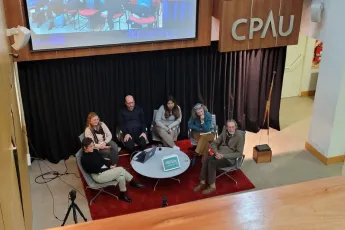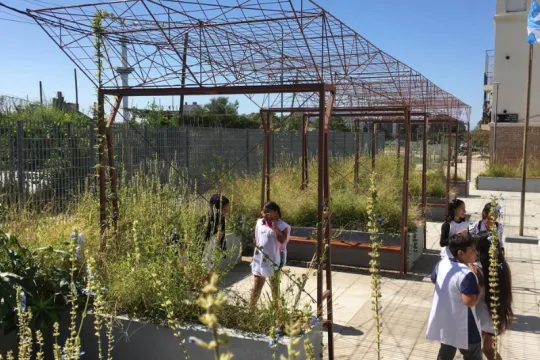
© CPAU
On August 20, 2025, the Barrio 20 Urban Lab presented the "Climate Change Adaptation Manual for Low-Income Neighbourhoods" at the Professional Council of Architecture and Urbanism (CPAU, in the Spanish acronym) of the City of Buenos Aires. This publication addresses climate change through self-help projects and community action, offering practical tools for professionals, organizations and residents committed to improving housing in urban contexts of inequality.
The event was coordinated by Roberto Frangella, Celeste Fisch and Carolina Jaroslavski, members of CPAU's Architecture for the Common Good program. This initiative promotes integrative and socially engaged architecture that places the common good at the heart of professional practice, fostering experiences in low-income housing, capacity-building and knowledge-exchange spaces, and delivering concrete responses to the demands of the most vulnerable sectors.
During the presentation, Jorgelina Hardoy explained that the Transformative Urban Coalitions (TUC) project seeks to achieve zero-carbon cities with social justice, emphasizing the value of urban governance and collaborative design with local stakeholders. Florencia Almansi spoke about the integration of environmental aspects into the Barrio 20 upgrading process. As is usually the case, this process was initially focused on "gray" infrastructure, thus highlighting the challenge of articulating social engagement with climate policies. Daniel Kozak described the content of the manual, explaining that it addresses two intervention scales: housing and public space, facilitating its practical application. He also pointed out the collaboration with the University of Sheffield's Live Project program. From a community perspective, Grecia Guzmán, an architect and resident of Barrio 20, emphasized the value of real participation and the practical and replicable nature of the manual, commenting on the interest it has generated in different work environments. Anabela Ullo, from the Instituto de la Vivienda de la Ciudad, described how the Barrio 20 pilot project influences public policy, allowing the modification of bidding procurement processes to include environmental and climate change criteria, such as reflective paint and rain gardens.
Closing the event, Celeste Fisch highlighted the manual's value as the result of a collective process that combines technical and community knowledge, transcending the printed format. She also advocated for an environmental perspective focused on improving quality of life, going beyond doomsday rhetoric.
The subsequent discussion with the audience focused on the manual's scalability in different regions of Argentina and environmental education as an essential tool in urban upgrading processes. Several speakers highlighted the manual's applicability and proposed its dissemination in neighbourhood libraries. The entire session has been recorded and shared in the section Conversatorios, Encuentros en la Biblioteca of CPAU’s YouTube channel.
